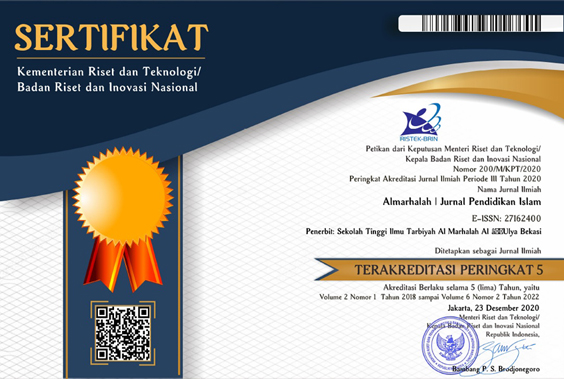KELUARGA SEBAGAI BASIS PENDIDIKAN ISLAM DAN PEMBENTUKAN KARAKTER ANAK
DOI:
https://doi.org/10.38153/jye27202Keywords:
Islamic Education, Household, Parents, Morality, Development StrategiesAbstract
In Islamic perspective, the family holds a fundamental position as the first educational institution that instills moral, spiritual, and social values in children. Parents bear full responsibility for shaping an Islamic personality through exemplary behavior, affection, and the cultivation of worship habits. This study aims to examine the role of parents in home-based Islamic education and to formulate strategies for nurturing children’s character based on the Qur’an and the Sunnah. The research employs a descriptive qualitative approach using a literature study method that draws from relevant academic sources. The findings indicate that the success of family education is determined by the level of awareness, consistency, and active involvement of parents in the guidance process. Effective strategies for character development include the habituation of worship, spiritual communication, moral exemplification, and compassionate discipline. A household that lives by Islamic values holistically serves as the primary foundation for raising a generation that is faithful, ethical, and strong in character within its social life.
References
Aqibuddin. (2007). Psikologi Pendidikan Islam. RajaGrafindo Persada.
Baharun, H. (2016). Pendidikan Islam dalam Keluarga dan Tantangan Globalisasi. UIN Press.
Djokowidagdho. (1994). Etika Tanggung Jawab dalam Kehidupan Sosial. Liberty.
Gade, A. M. (2012). Children as Blessing and Trust in Islamic Perspective. Prenadamedia.
Hamady, H., & Nabil. (2024). Genealogi Intelektual Syekh Muhajirin Amsar Addary Dalam Pengembangan Pendidikan Islam di Bekasi. Almarhalah: Jurnal Pendidikan Islam, 8(1), 120–134. https://doi.org/10.38153/almarhalah.v8i1.84
Hasbullah. (2001). Dasar-Dasar Ilmu Pendidikan. RajaGrafindo Persada.
Indrawati, N., & Rahimi, F. (2019). Peran Orang Tua dalam Pendidikan Karakter Anak di Era Modern. Jurnal Pendidikan Islam, 8(2), 115–130.
Munandar, U. (2002). Psikologi Keluarga dan Perkembangan Anak. Alfabeta.
Nabil, N. (2020). Dinamika Guru Dalam Menghadapi Media Pembelajaran Teknologi Informasi Dan Komunikasi. Almarhalah: Jurnal Pendidikan Islam, 4(1), 51–62.
Salahuddin, A. (2011). Pendidikan Anak dalam Islam. Pustaka Setia.
Sugiarti, D. (2021). Keluarga sebagai Basis Pendidikan Karakter Islami. Jurnal Tarbawi, 6(1), 45–58.
Suyadi, & Maulidya, N. (2013). Konsep Dasar Pendidikan Anak Usia Dini dalam Islam. Remaja Rosdakarya.
Taubah, S. (2015). Nilai-Nilai Pendidikan Islam dalam Pembentukan Karakter Anak. LKiS.
Ulwan, A. N. (1993). Tarbiyatul Aulad fil Islam. Dar as-Salam.
Wahyu, S. (2006). Antropologi Pendidikan dan Keluarga. Pustaka Pelajar.
Downloads
Published
Issue
Section
License
Copyright (c) 2025 Muhammad Kumaidi, Elshafa Nur Ahmad Ridho, Eka Pitria, Faizal Yusup, Edri Firmansyah, Evi Febriani

This work is licensed under a Creative Commons Attribution 4.0 International License.









